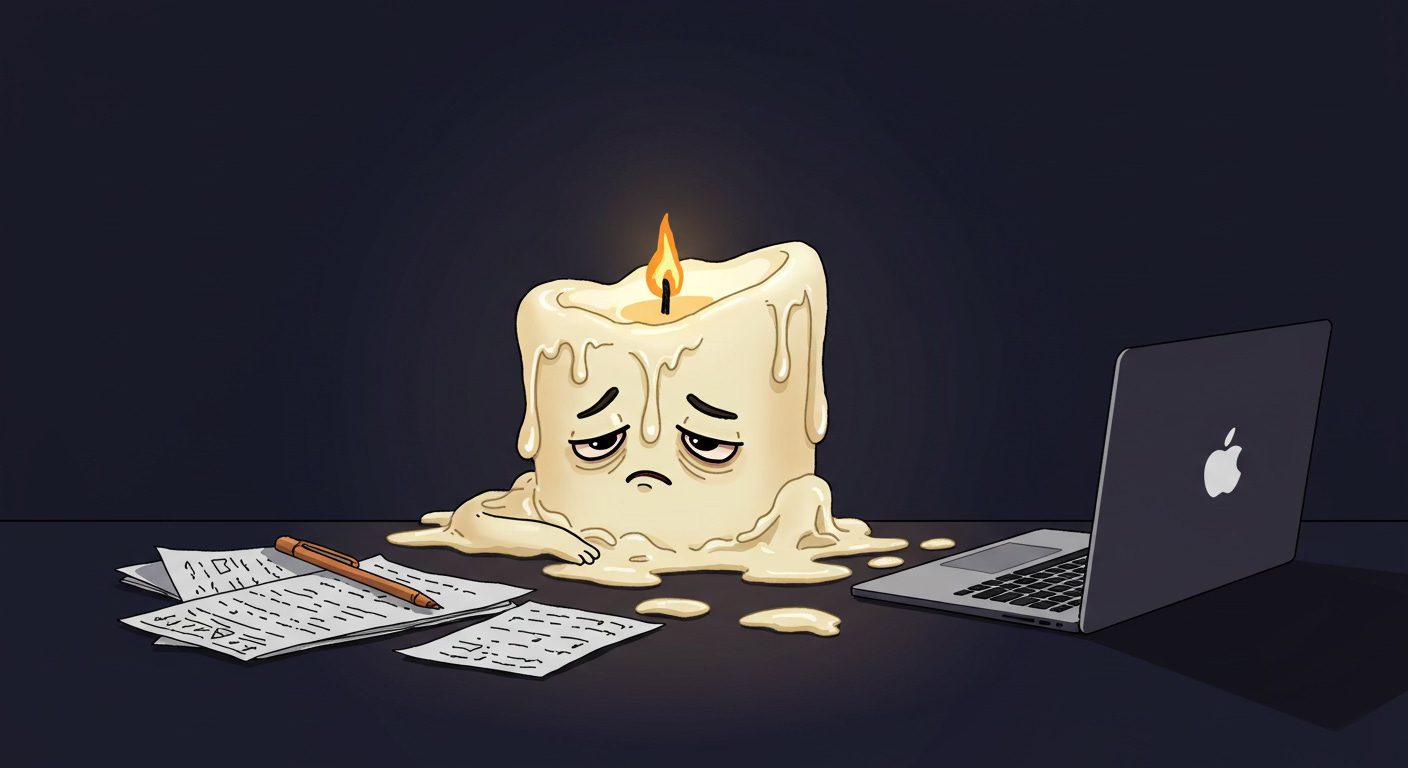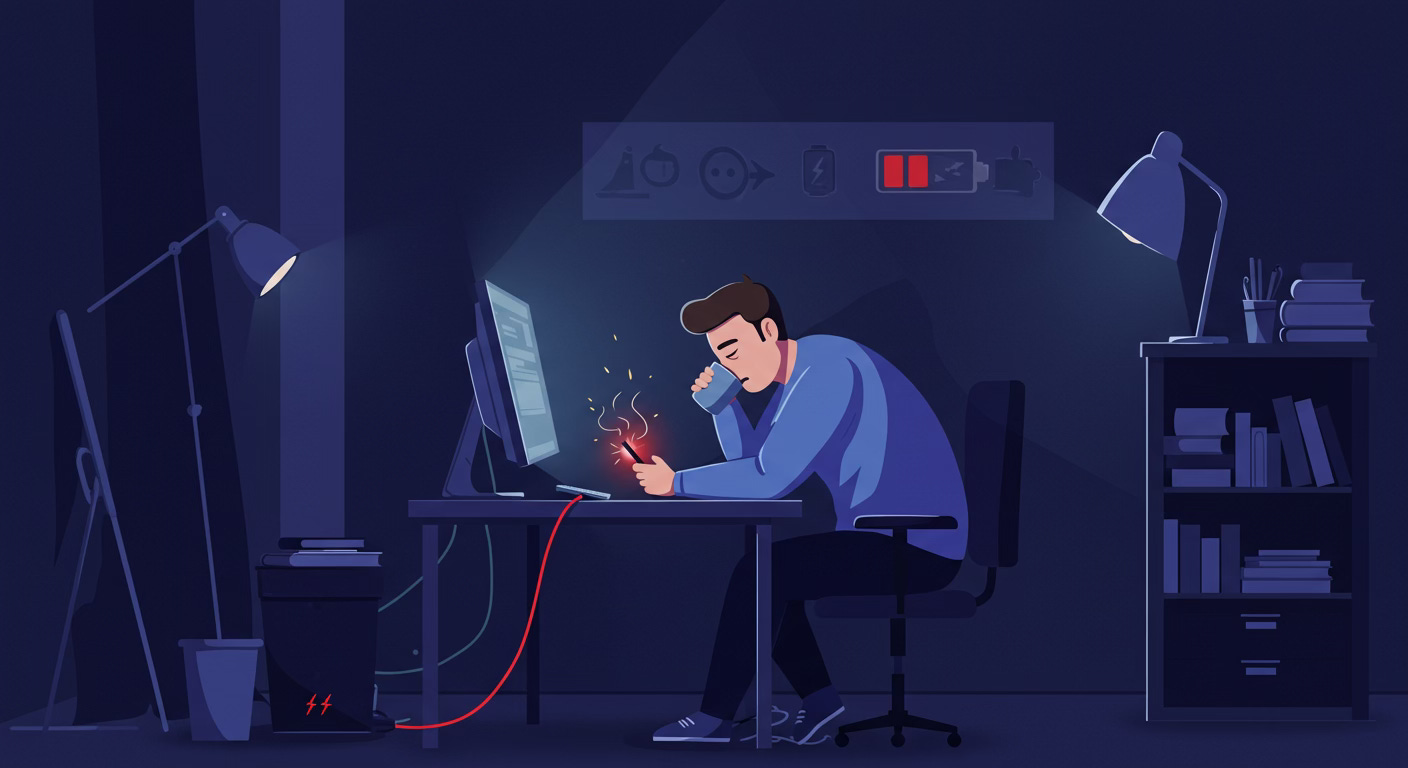Lessons from Millennial Masters on building for the long haul
By Daniel Ionescu
You rarely see burnout coming. Most founders think it’s just a rough week, another all-nighter, a patch to “push through.”
I’ve fallen for it too, telling myself it’s normal to feel run-down, that it’s just the price of building something from scratch.
Until one morning, you stare at the screen and realise you’re not just tired, you’re empty.
That’s why I went back through my Millennial Masters interviews, digging for the real talk on burnout: how to spot it, how to fix it, and how founders are building lives (and companies) that don’t run them into the ground. 👇🏻

Mike Jones, founder of Better Happy, didn’t realise he was burning out when he was running his CrossFit gym business, until he was already on the other side:
“I don’t think I consciously knew I was getting burnt out. I just felt really stressed and didn’t have a label to put on that. I didn’t realise till about two months after I’d closed the gym how bad I was.”
Tom Hutchinson-Smith, Straight Line PT, puts it just as bluntly when he was working on establishing a premium gym brand in Dubai:
“I just ran myself down into the ground and I kind of lost a little bit for it and I was a bit burnt out and I needed a clean slate basically.”
Burnout doesn’t show up waving a flag. It sneaks in quietly: through lost motivation, low mood, the sense that you’re running but not moving. You only realise it’s hit when you finally slow down.
Oliver Yonchev, co-founder of cocreatd, is the first to admit he gets energy from hard work, but also that he might not always see burnout coming:
“Look, I’m the worst person to ask for this. I could be burnt out as I’m answering this right now. What I will say is that I really enjoy what I do. I love the people I work with. I get fuel from taking on difficult challenges. That’s me being self-aware. That’s not me preaching that everybody should behave and act the way I do.”
But even Oliver has learned to mix up his routines to protect his energy and avoid the “performance drain” of endless virtual calls:
“One thing that I try and do is mix up my formats. If we had an in-person conversation, I would get fuel. Where I don’t get fuel is if I have too many virtual conversations. So what I tend to do is mix phone calls in my day alongside virtual ones, and trying to do as many in-person things as I can. That seems to give me the fuel and energy in a really practical way.”
Big ideas and bold moves. For founders and leaders building what’s next.
Mike Jones:
“I think the actual issue is the stress. When you’re not managing that stress well, you’re going to know that because you’re feeling highly stressed a lot of the time and you’re not feeling relaxed and peaceful very often at all. The business is constantly on your mind. If you’re resonating with that, you’re on a path to being completely burnt out.”
Nick Telson-Sillett, co-founder of Trumpet, admits he didn’t clock the early signals of burnout when he was scaling DesignMyNight:
“I think you just got to be very self aware, which I wasn’t in my early days. Be aware when you feel like you might be overwhelmed, or you do start to burn out.”
Most founders ignore these signals, assuming stress is just part of the deal.
But if you’re never relaxed, can’t switch off, or can’t remember your last day of real rest, you’re already heading for a breakdown.
For some, burnout arrives with a bang. For others, it’s a slow grind down.
Tom Hutchinson-Smith shared what it felt like to start over:
“I gave myself like a six-month buffer, because I’d burnt myself out. I didn’t want to go full in[to something new] and have the same problems again. I was very casual with it. The time was to myself really.”
Gemma Price, founder of HubGem, was forced to take a break when she became a mum, and found her team stepped up without her:
“I had an amazing team who will not let me down, who I trust wholeheartedly, who will do an excellent job. In fact, performance was up in some areas, so maybe I’ll do it more often. It’s just having an amazing team who sorted everything.”
Sometimes you only understand how burned out you were when you finally step back. And sometimes, life does you the favour.
Mike Jones rebuilt from the ground up after closing his first business:
“I did some work with psychologists and counsellors and business mentors. I had to make a decision: I need to figure out how to own a business and not be a stressed a**hole, basically. I started sharing those and then that led to traction and people interacting with the posts and us getting some work. I was like, oh, this is cool. This is a business.”
For Tom Hutchinson-Smith, the antidote was easing back in, not racing ahead.
For Nick Telson-Sillett, it’s all about protecting your non-work time:
“Every morning, I go for a walk without fail pretty much, normally about an hour. I don’t look at my phone during that walk. Make plans to see your friends, your family, so you don’t burn out quicker. So make time to spend with your loved ones, be outside, exercise.”
Will Polston, North Star Thinking, says high performers are ruthless about focus:
“Peak performance is a subtraction game. Your peak performance is equal to your potential minus distractions. When people stop and reflect and go ‘right, is this that does the version 2.0 of me really need to be, doing these things or saying these things or being with these people?’ And if the answer is no, then they’re willing to subtract it from their life.”
Turns out, the secret isn’t more bubble baths or time-blocking. It’s deleting what drains you (projects, people, routines) until what’s left actually gives you energy.
Gemma Price enforces boundaries for herself and her team:
“I finished work at five o’clock every day. How many business owners and CEOs can say that? And I do it because that’s not my whole world, right? That’s built into the company culture, that it’s not acceptable to be sacrificing your home life in order to have a successful career.”
Will Polston credits environment and peer group:
“Environment’s a huge component. For me, the people you surround yourself with is part of that action. I think it was Jim Rohn who originally said you’re the average of the five people you spend the most time with. And in my experience, I’ve seen that to be true.”
Culture, boundaries, and community aren’t “nice-to-haves.” They’re non-negotiable if you want to survive the founder marathon.

If you can’t remember your last day off, you’re overdue for one.
Your phone’s off, your brain’s still on? That’s not rest, that’s denial.
Structure is freedom: schedule your downtime as ruthlessly as you schedule your hustle.
Subtract before you add. Fewer tasks, fewer people, fewer distractions.
The Millennial Masters are still standing because they learned when to stop, not just how to start.
I’ve missed the signs in my own journey, thinking grit could outrun exhaustion.
The best founders I had on Millennial Masters aren’t superhuman. They build friction into their days, let themselves pause, and don’t apologise for time spent recharging.
If you’re serious about playing the long game, treat energy like your only real asset. When you protect it, you get more than stamina. You get perspective, better decisions, and space for whatever comes next.
After hundreds of hours of research, interviews, and expert insights from Millennial Masters, I’ve curated the ultimate reading list: 50 powerful books with 250 actionable takeaways.